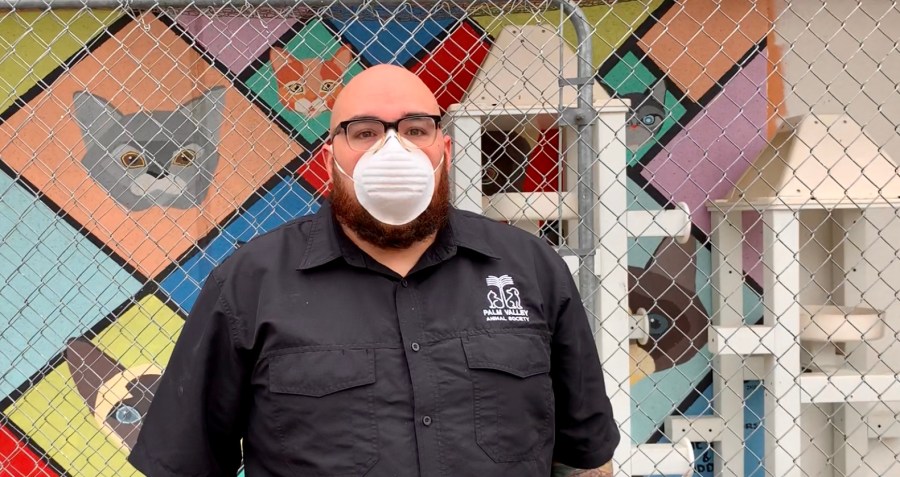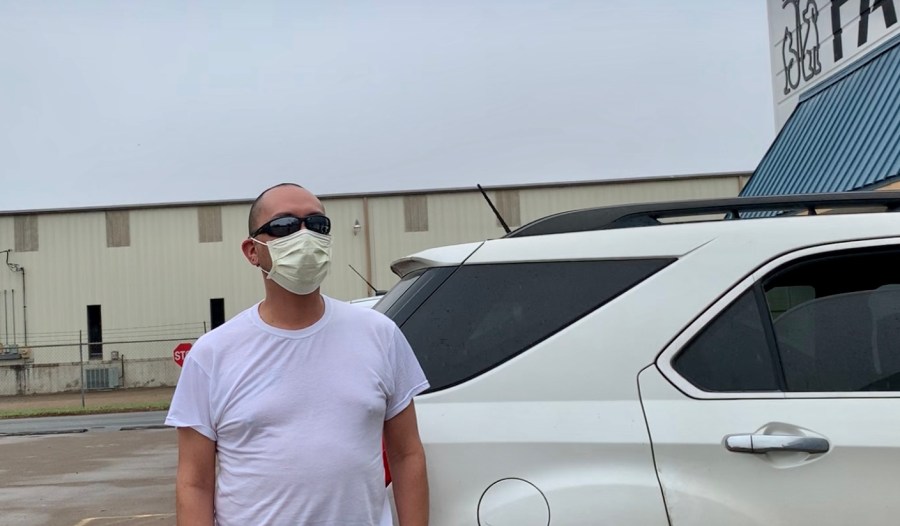EDINBURG, Texas (Border Report) — These may be trying days for humans, but dogs (and even cats) are loving having so much company at home. And in South Texas, which has traditionally had an abandoned-pet problem, the number of pet rescue adoptions have doubled recently as more border communities implement shelter-in-place restrictions due to COVID-19.
The Palm Valley Animal Society’s original rescue facility in Edinburg, Texas, had 600 adoptions, mostly of dogs, during March — that’s double the normal amount, the facility’s operation’s director Michael Bricker said Monday as he gave Border Report a tour of the facility. And their newer facility, the Laurie P. Andrews Center a few miles away, also doubled its number of pet adoptions last month.

There are only 10 cats left, but they had 433 dogs at their original location, which for several years had the notorious reputation of having the highest euthanasia rate of any shelter facility in the state. But thanks to an aggressive re-branding campaign and push to become a no-kill facility — coupled with the recent pandemic that has spurred adoptions — the facility went from having just a 36% save rate to an 89% adoption rate in March, Bricker said. This is a far cry from the fall, when in September hundreds of animals there were at risk of being killed, according to a KVEO-TV report.
“Have an animal that you are saving their life. You can take them on a nice long walk. It gets them out of the shelter. It keeps you sane, keeps you moving. This is the best thing you can possibly do. Come out, come adopt,” Bricker said.
It gets them out of the shelter. It keeps you sane, keeps you moving. This is the best thing you can possibly do. Come out. Come adopt.”
Michael Bricker, Palm Valley Animal Society operation’s director
Currently, all adoption fees are waived and Palm Valley has even begun two types of curbside adoptions from their parking lot to attract families looking for a new furry member to take home. They also are pushing foster care, which allows animals to be taken home for a weekend, or longer, with no strings attached.

In their “Love is Blind” program — named and fashioned after the popular Netflix series — shelter staff pick out what they believe the perfect pet would be for someone who fills out an online questionnaire. “Our matchmakers find the best animal for you and then you come in for the big reveal of the animal we’ve picked out for you,” Bricker said.
Families still can enter the facility, but only one family at a time, due to restrictive social distancing regulations in place in Edinburg. On Monday, the city also began requiring anyone out in public to cover their mouths and noses. The city also requires no more than 10 people inside a facility at once, and to wear masks or face covering inside public buildings, as well.
“You have to be wearing a mask but can walk around and look at the animals then go back to your car and give us a call and we’ll do adoption counseling over the phone and then we’ll bring the dog or cat out to you soon after,” Bricker said.
The Humane Society of the United States says “now is a great time to adopt a pet to reduce the potential strain on shelters and to offer to foster in case shelters start receiving an increase in requests for foster care of pets for seriously ill or hospitalized people.”
Evan MacLean, a University of Arizona biological anthropologist and comparative psychologist, says dogs may provide welcome emotional support during the pandemic. An assistant professor of anthropology and director of the Arizona Canine Cognition Center in the College of Social and Behavioral Sciences, MacLean says the company of dogs could ease negative mental health impacts as people are more isolated during this pandemic.

“There are a good number of studies that suggest dogs can have a stress buffering effect on people going through challenging times. We see this not only in terms of people’s perceived sense of well-being, but also in terms of physiological measures like heart rate, blood pressure and cortisol – a hormone involved in stress responses. Part of the effect is probably very similar to the support we get from our human friends and family, who can help us to weather the storm. Dogs may provide that same kind of social support, as figures that will be beside us through thick and thin,” MacLean wrote on a university website encouraging more human-to-canine interaction right now.
The Centers for Disease Control and Prevention says there is no evidence that household pets can contract or spread COVID-19, although on Sunday it was reported that a tiger at the Bronx Zoo in New York City tested positive for coronavirus and several other tigers and lions were exhibiting symptoms.
On Monday morning, Jose Reyes, 44, of Edinburg, waited in his car 45 minutes before the Palm Valley facility opened hoping to adopt a Boston terrier he had seen advertised on social media. But the dog wasn’t available for adoption until the afternoon, and Reyes, 44, who works at a skilled nursing rehab facility said he had to work.

Reyes adopted a poodle mix on Valentine’s Day in 2018 and now he wants to add to his two-dog pack during this time of self-isolating to keep him company.”I’m trying to help out too, because there’s a big over-population problem here as far as pets go,” he said.
Bragging about his poodle, he added: “She’s a great dog, she’s very happy-go-lucky, quiet, clean, smart house-broken. And she’s spade.”
Although no surgeries to spade or neuter are currently being performed at Palm Valley, because the staff feels the medical equipment is more needed to treat humans, Bricker said that doesn’t mean owners shouldn’t come and adopt. They should just make sure they keep an eye on their new pets and make sure they maintain social distancing, also, so there isn’t an unwanted influx of pets a few months from now.
















